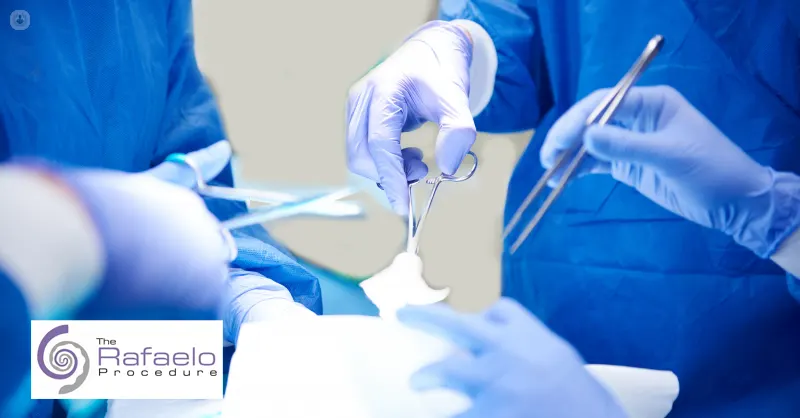The Rafaelo procedure is a minimally invasive treatment for internal haemorrhoids, which offers an alternative to traditional surgical methods. The treatment gained popularity due to its efficiency and reduced recovery time compared to other conventional procedures.
Internal haemorrhoids are swollen blood vessels located inside the rectum or anus, often causing discomfort, pain and bleeding during bowel movements. The Rafaelo procedure is primarily aimed at treating grades 1 to 3 internal haemorrhoids, which are less severe and have not yet prolapsed outside the anus.
The procedure involves radio-frequency energy to shrink and eliminate the haemorrhoidal tissue. It is typically performed under local anaesthetic, meaning that patients can return home on the same day. The steps of the Rafaelo procedure are as follows:
Preparation: The patient is positioned comfortably, usually lying on their side, with knees curled up towards their chest. The doctor cleans the anal area and administers local anaesthesia to numb the region.
Insertion of Probe: A special probe, equipped with a radiofrequency emitter, is gently inserted into the rectum to reach the affected hemorrhoidal tissue.
Radiofrequency Ablation: Once the probe is properly positioned, radiofrequency energy is emitted. This energy heats up the hemorrhoidal tissue, causing it to shrink and eventually scar. The scar tissue formed helps to stabilise the blood vessels, reducing the likelihood of hemorrhoid recurrence.
Post-Procedure Care: After the treatment, patients are monitored for a brief period before being discharged. They are usually advised to follow a soft diet and take pain relievers if needed. Most individuals can resume their normal activities within a few days.
Benefits of the Rafaelo procedure
Minimally Invasive: Unlike traditional surgical procedures, the Rafaelo technique does not involve cutting or excising tissue, resulting in minimal trauma and faster recovery.
High Success Rate: Clinical studies have shown that the Rafaelo procedure effectively alleviates symptoms associated with internal haemorrhoids, with a low risk of complications.
Outpatient Procedure: Since the procedure is performed on an outpatient basis and does not require general anaesthesia, it offers convenience and reduces healthcare costs.
Reduced Pain and Discomfort: Patients typically experience less pain and discomfort compared to traditional hemorrhoidectomy, as the procedure targets the hemorrhoidal tissue directly without affecting surrounding healthy tissue.
While the Rafaelo procedure offers several advantages, it may not be suitable for all individuals, especially those with severe or prolapsed haemorrhoids. Therefore, it is essential for patients to consult with a qualified colorectal surgeon to determine the most appropriate treatment option based on their specific condition and medical history.










